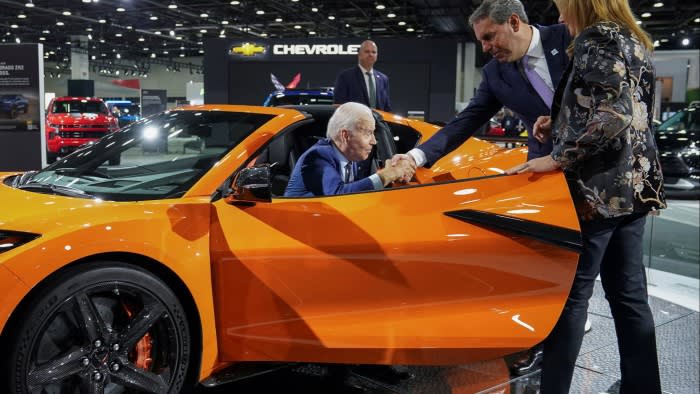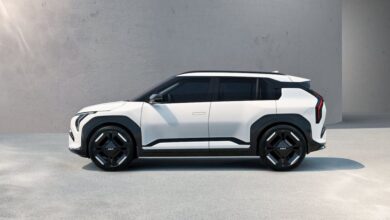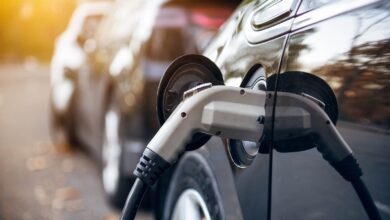US is skulking behind EV tariff walls

Welcome to Trade Secrets. Right now in the trade world it’s all electric vehicles all the time. The big news last week was President Xi Jinping’s tour of Europe, which conspicuously didn’t take in Berlin or Brussels but did alight on Paris, Budapest and Belgrade, with the threat of EU anti-subsidy duties on Chinese EVs providing some tasty context. This week it’s the widely trailed announcement of US tariffs on EVs and other products by President Joe Biden. Charted waters is on governments losing fuel tax revenue as consumers switch away from conventional cars.
Get in touch. Email me at alan.beattie@ft.com
Xi’s an EV lover
(It’s a song.) Why an incumbent president running for re-election has chosen to unveil largely symbolic tariffs six months before polling day I guess we’ll never know. As lots of people have already correctly pointed out ahead of the announcement, duties even of 100 per cent will mean almost nothing to the US EV market, where Chinese goods are already kept out by a combination of 27.5 per cent tariffs, plus exclusion from the Inflation Reduction Act’s EV tax breaks for consumers. The real action here is whether Chinese companies will be able to sneak autos into the US market via Mexico.
EVs thus join steel in the “purely performative” category of Biden tariffs. The president recently said he would triple steel tariffs, but because of decades of assiduous use of anti-dumping and countervailing duties, China has a similarly tiny share of the US steel market.
Predictably, the tariffs will involve a pretty blatant misuse of US trade law. The Section 301 provisions Biden is invoking were designed to counter specific instances of unfair treatment by trading partners, not serve as a catch-all excuse for bashing a rival. The EU is at least doing its anti-subsidy tariffs by the book.
The action also shows an interesting political calculation — that symbolic increases in tariffs are worth the risk of retaliation of the kind China has threatened to impose on French cognac. As well as (or, improbably, instead of) retaliation, Beijing could bring a World Trade Organization case — or it could just content itself with shouting rude words through USTR’s letterbox and running away, which would have about the same effect.
But the most important thing is this: the White House isn’t mainly bothered how quickly the US adopts EVs. EV penetration of the US car market is miles behind that of China, and indeed the EU. Sales of EVs in the US are slowing and US manufacturers are switching to hybrids. And still the administration is mainly concerned with US companies’ market share, not the size of the market.
It was clear right from the beginning of the Biden administration that the IRA and other government programmes were supposed to hit a variety of different goals simultaneously and it would at some point have to choose. The hierarchy of those goals is now evident. Having green tech (solar panels being another example) made in the US, preferably by unionised workforces, turns out to be far more important than actually decarbonising the economy.
Xi’s electric
(Another song, though others got to this one first.) Which brings us to the EU and its own EV issues. The Chinese president’s Europe visit last week caused almost as much talk of internal divisions as the Eurovision Song Contest, though if anything with a bit less geopolitical argy-bargy.
But for all the talk of divide-and-rule, Xi spending his time solemnly signing a memorandum of comradeship with Hungary and love-bombing Serbia (population 7mn, GDP smaller than Luxembourg, not joining the EU any time soon) is a bit of a comedown from the days when China assembled the “17+1” grouping of pals in central and eastern Europe.
In reality Viktor Orbán’s cosying up to Xi isn’t an existential threat to the EU as an economic and trading bloc, any more than the Hungarian prime minister’s bromance with President Vladimir Putin. Orbán is an opportunist chancer who needs to keep generating cash to finance his clientelist regime, not a principled Eurosceptic nor even an anti-democracy ideologue. His posture-striking down the years has helped to keep the cohesion money rolling in from Brussels despite rule-of-law considerations: it has not created a serious threat of breaking up the EU.
Orbán will never leave or destroy the EU because that money would disappear, along with Hungary’s precious jobs in the German auto supply chain. (It’s been said before that Hungary is an Audi-ocracy more than an autocracy.) Nor does he particularly throw his weight around in EU debates on Beijing’s behalf. The EU has created a bunch of trade tools to use against China that Hungary has not seriously attempted to block.
But won’t those German car jobs get replaced by Chinese car jobs? BYD, which is aiming to outsell Tesla in the EU by 2030, is building its first EU plant in Hungary. Well, there’s more than a touch of political and regulatory risk there. As I wrote last week, if the European Commission uses the Foreign Subsidies Regulation (FSR) against the EV manufacturing plants Chinese companies are building in Europe, things could get very spicy indeed.
In choosing whether to move against state-subsidised Chinese EV factories in Europe, the EU faces its own dilemma. Does it want to green its economy more than it wants EVs to be built by European-owned manufacturers? Unlike the US, it has already pretty much made that decision with solar panels and gone for the former option, importing Chinese solar products on a massive scale.
An FSR investigation against a Chinese auto plant in Hungary really would be a corker of a political question for the EU to face. It’s not that far in the future either. BYD wants the plant up and running in three years. Ladies and gentlemen, place your bets please!
Charted waters
The shift away from conventional vehicles is hitting governments’ fuel tax revenues, causing them to increase fees and taxes on electric vehicles.
Trade links
Chinese EV manufacturers have raised increasing amounts of money from overseas markets despite threats of trade protectionism.
Adam Tooze warns about the threat of a politically driven devaluation of the dollar.
The EU’s development commissioner warns that the EU is struggling to counter Chinese influence among low and middle-income countries.
The head of the Brussels think-tank Bruegel says that the collapse of political ties between the EU and China is more dangerous than the decoupling of trade.
Politico looks at what the EU needs if it gets a new trade commissioner after the forthcoming European parliamentary elections.
Trade Secrets is edited by Jonathan Moules



